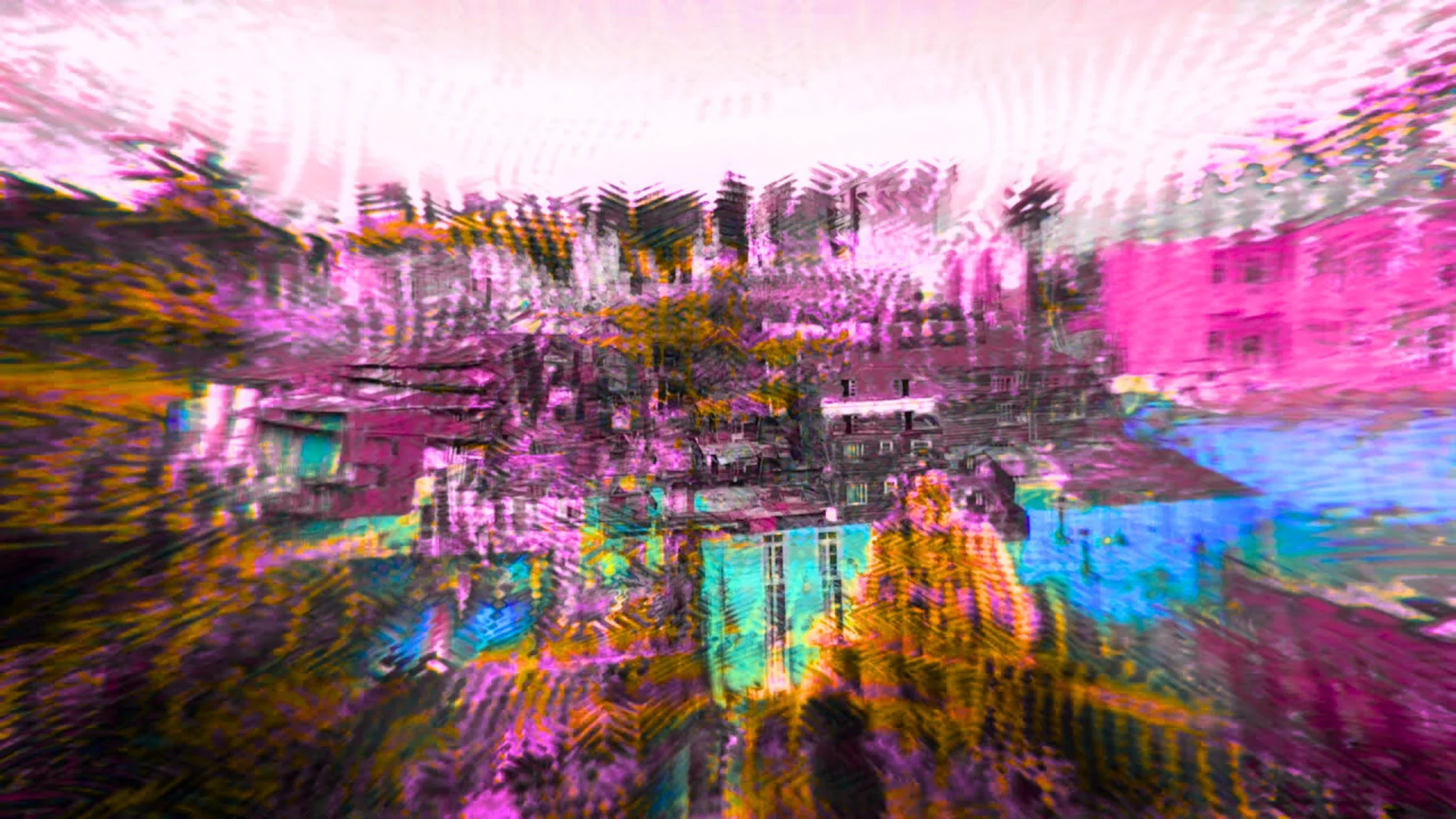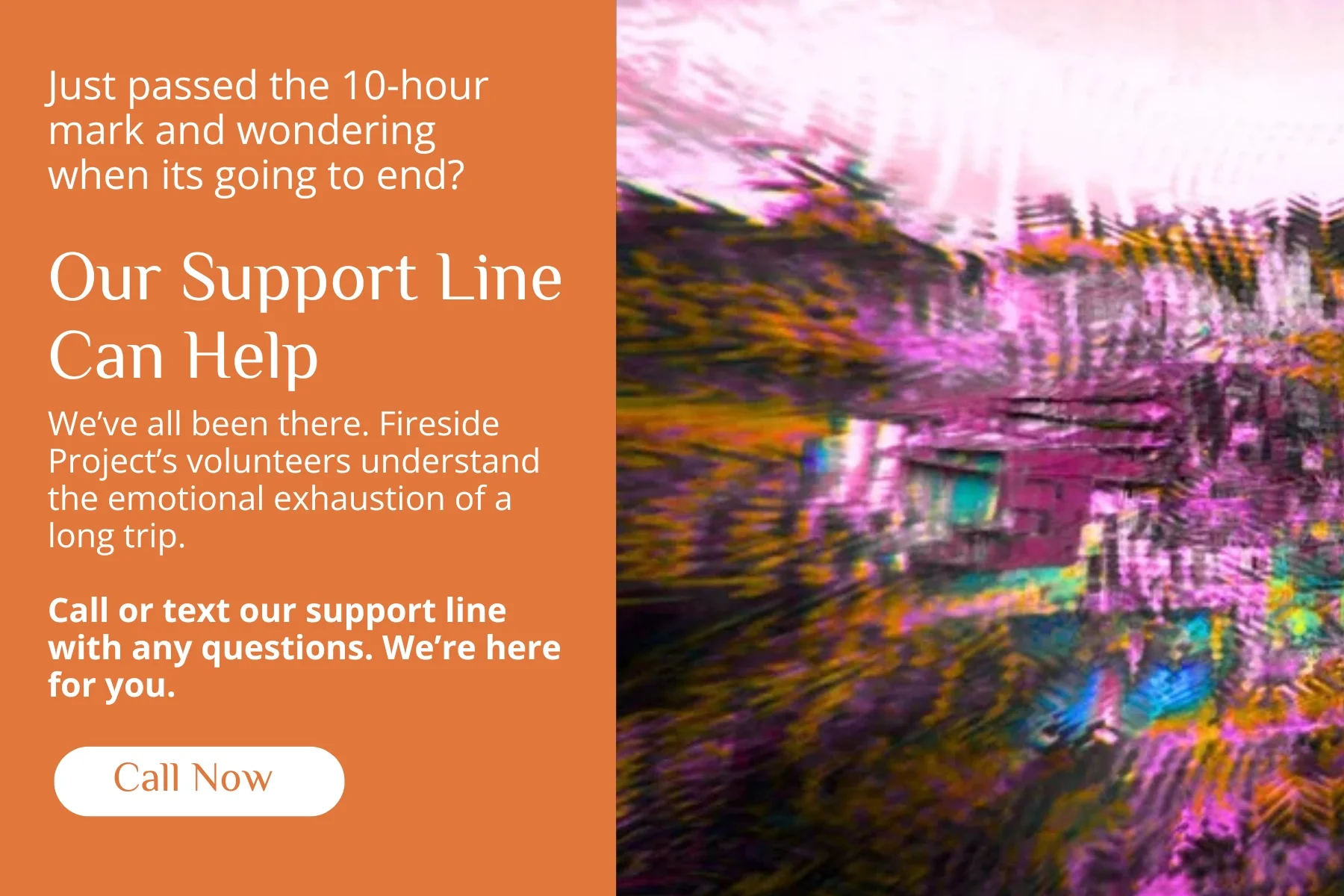LSD and the Long Ride: What Fireside Project Has Learned from Supporting People on Acid
Lysergic acid diethylamide (LSD) is one of the most famous psychedelic substances worldwide. It is also a common topic on the Fireside Project Psychedelic Support Line. Around 15% of our calls and texts involve LSD, making it one of the top three substances discussed with our volunteers.
Because LSD trips can last up to 12 hours or more, both experiencing LSD and/or trip sitting someone else who is can be a long journey. These calls are often among our most in-depth. In this post, we explore what we’ve learned from these conversations, what makes LSD unique in both science and culture, and how our services—both the free Support Line and Fireside-Certified™ Coaching—can help support safer, more grounded psychedelic experiences.
Some Stats and Commonalities
Across thousands of calls, LSD-related conversations tend to share a few common threads:
Duration: LSD’s long timeline can catch people off guard, especially when the intensity lingers.
Questions about “normalcy”: Callers often ask, “Is this normal?”—referring to time distortion, looping thoughts, or visual shifts that can feel endless.
Grounding and reassurance: Many people reach out simply to hear another calm voice and to be reminded that they’re safe and not “stuck like this.”
Integration curiosity: A growing number of callers contact us after their LSD experience, looking for help making sense of insights, emotions, or lingering sensations.
Our trained volunteers start every conversation with harm reduction in mind. They offer nonjudgmental, kind, and informed peer support. They never give orders or strict advice.
What Our Callers Say
Fireside’s volunteers have supported people at all stages of the LSD experience, from first-time trippers to seasoned psychonauts reflecting on decades of use. Some of the most common reflections include:
“It lasted way longer than I expected.”
“I didn’t realize how much my set and setting mattered.”
“I thought I was fine until about hour six, then things got intense.”
“Talking to someone who wasn’t panicking helped me feel grounded.”
These moments underline one of LSD’s defining features: its capacity for both beauty and challenge. While many find it expansive, others encounter difficult emotions, looping thoughts, or physical discomfort. Fireside’s Support Line exists to meet people wherever they are on that spectrum, with empathy, context, and care.
An Exceptionally Brief History of LSD Science and Culture
Discovered in 1938 by Dr. Albert Hofmann worked at Sandoz Laboratories in Switzerland. LSD became famous not because of its lab origins but because of Hofmann's "bicycle day" in 1943. On that day, he intentionally took a small amount and had the first acid trip.
In the 1950s and early 1960s, LSD was used experimentally in psychiatric research throughout the early stages of psychedelic therapy, exploring its potential in the treatment of alcoholism, anxiety, and depression. Early clinical trials suggested promise, but as LSD spread into the counterculture, fuelled by charismatic figures like Timothy Leary and Ken Kesey of Acid Tests fame (please don't drug people without their consent) and with a culture producing iconic music from groups like the Grateful Dead and Jefferson Airplane. It became associated with rebellion, music, free love and the counterculture movement to a far greater degree than with therapy.
LSD also has a sinister side, having been used by the CIA and US military in attempted mind control experiments under Project MKULTRA.
In 1970, LSD was added to the list of Schedule I controlled substances, effectively halting most scientific research for decades.
Today, interest has returned. Modern clinical trials are studying how LSD affects mental health, brain networks, and psychiatric disorders. They look at its effects on the default mode network and serotonin 2A receptors. These parts of the brain influence perception and mood. Researchers from institutions like Hospital del Mar Medical Research Institute and Universitat Autònoma de Barcelona continue to uncover insights about how LSD alters consciousness and emotional processing.
While science evolves, so does the human story. That's where Fireside comes in.
When a Trip Becomes a Journey
Because LSD experiences can unfold for half a day or more, even small choices—like overstimulation, dehydration, or fatigue—can amplify intensity. Our Support Line has heard from countless people who began with curiosity but found themselves seeking reassurance hours later.
That’s why harm reduction and set and setting remain central themes in our conversations. Simple grounding tools—like adjusting lighting, hydrating, or listening to calming music—can make a world of difference.
And when the experience feels too big to process alone, that’s where Fireside-Certified™ Coaching can help. Coaches trained through Fireside’s extensive program offer personalized, ongoing support for meaning-making, integration, and preparation for future experiences. Every new client starts with a free 20-minute consultation to explore whether coaching feels like the right fit.
How Fireside Supports People Using LSD
Fireside Project offers two key forms of support for those exploring psychedelics:
The Psychedelic Support Line – Free, confidential, and available by phone or text. Volunteers are trained in peer support, harm reduction, and crisis de-escalation for a wide range of psychedelic experiences, including LSD.
Fireside-Certified™ Coaching – A professional coaching service for deeper integration work, helping people translate their psychedelic insights into sustainable growth.
Whether you’re currently navigating a challenging LSD experience or reflecting afterward, Fireside’s services exist to help you feel safe, supported, and grounded.
Trip Safe
LSD has been important in both psychedelic science and cultural change. It remains one of the most powerful, complex, and unpredictable psychedelics today.
At Fireside Project, we don’t encourage or discourage its use. Instead, we meet each person where they are, ensuring that curiosity doesn’t come at the cost of care. Whether through a call to the Support Line or a session with a Fireside-Certified™ Coach, you’re never alone in navigating the long, strange trip that LSD can bring.
Need support during or after a psychedelic experience?
Call or text Fireside Project’s Psychedelic Support Line at 62-FIRESIDE (1-623-473-7433).
Are you curious about psychedelic integration coaching? Schedule your free 20-minute consultation with a Fireside-Certified™ Coach today to explore how professional support can help you process and grow from your experiences.



